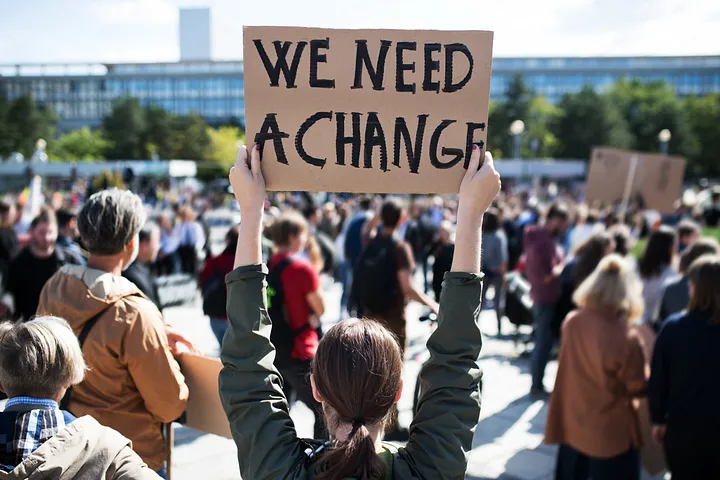 When I was at university, being an environmental activist was such a central part of my identity that I was nicknamed Captain Planet.
When I was at university, being an environmental activist was such a central part of my identity that I was nicknamed Captain Planet.
The belief system I had was that polluters and exploiters cared more about money than the harm they were doing, and the average citizen cared more about an easy life than taking a stand, changing their behaviour, going to a protest or learning about the issue.
Eventually, I gave up being an activist, because it felt as though nothing I was doing was working. Trying to live a low-carbon lifestyle, protesting, encouraging people to save energy, signing petitions — none of it seemed to be making one iota of difference to the unrelenting increase in carbon emissions.
What I wanted was a world in which we cared for each other and the Earth. My unquestioned assumption was that the way to do that was to defeat the bad guys who were doing all the harm.
I was trying to use anger, shame and guilt to make people more caring.
I think this is relevant to write about now, because I see this mentality so much in the way people approach issues such as sexism, racism, xenophobia and homophobia.
Here are 10 ways I think my mentality was making things worse.
1) Hatred
I really hated the climate sceptics, the fossil-fuel lobby and anyone who was opposing action, because they were a threat to our future.
I wanted to achieve harmony through hatred.
How was that going to work?
2) Separation
I felt really alone in my activism. We were such a minority. The majority seemed apathetically complicit in the violence of the system.
How was I going to achieve harmony if I felt so separate? Connection was what was needed.
3) Self-righteousness
The upside of no one else caring or being interested was that I felt exceedingly morally superior. I knew more about the solutions, had better solutions, and was taking more action than most people. So I felt above them.
Of course, this made me feel even more alone.
4) Creating gridlock
Have you noticed what happens when you have a disagreement with someone and you insist that you are right and they are wrong? It creates an impasse. Both sides dig their heels in. How was I hoping to change things through gridlock?
5) Diverting attention from solutions
Gridlock meant we weren’t actually moving forward with healing the planet. It was continuing to get worse during all the bickering.
6) Increasing the possibility of violence
What do you do when someone digs their heels in? Raise your voice? Attack them verbally? Maybe even physically?
When the struggle has become about one trying to overpower the other, things get nasty quickly. Just look at your Twitter feed.
7) Violence against myself
I was not paying attention to what would make me feel good. What I should do to save the planet was more important.
8) Focusing on what we didn’t want
‘Stop climate chaos’, ‘Carbon zero now’ — I was putting a lot of energy into opposing what was happening, and very little into imagining a compelling alternative.
9) Making environmentalism very unappealing
‘You know how you love going somewhere warm on holiday, you need a car to get about and your favourite food is steak? All those things are wrong, and you shouldn’t do them.
Right, who’d like to sign up to saving the planet?
10) Reinforcing the myth of separation
To believe it’s in your interest to exploit people and planet, you’ve got to believe they’re separate from you. If you judge people for not caring, you’re believing the same thing.
The mindset I try to live from now is one that sees the interconnection between me and the world: that my wellbeing is interdependent with everyone and everything else.
So, instead of needing to change other people, I seek to connect with them and understand them more.
In my work as a coach, if I slip into trying to fix my client, I can sense the disconnection that happens, the disempowerment in them and the lack of potency in the session. It also starts to feel like much harder work!
But I don’t want to fall into the trap of judging myself for being judgmental. By throwing myself headlong into that world, I learned so much, and it’s really made me who I am today. It also makes me feel empathetic when I see other people being angry, judgmental and trying to change people. It just really doesn’t work.